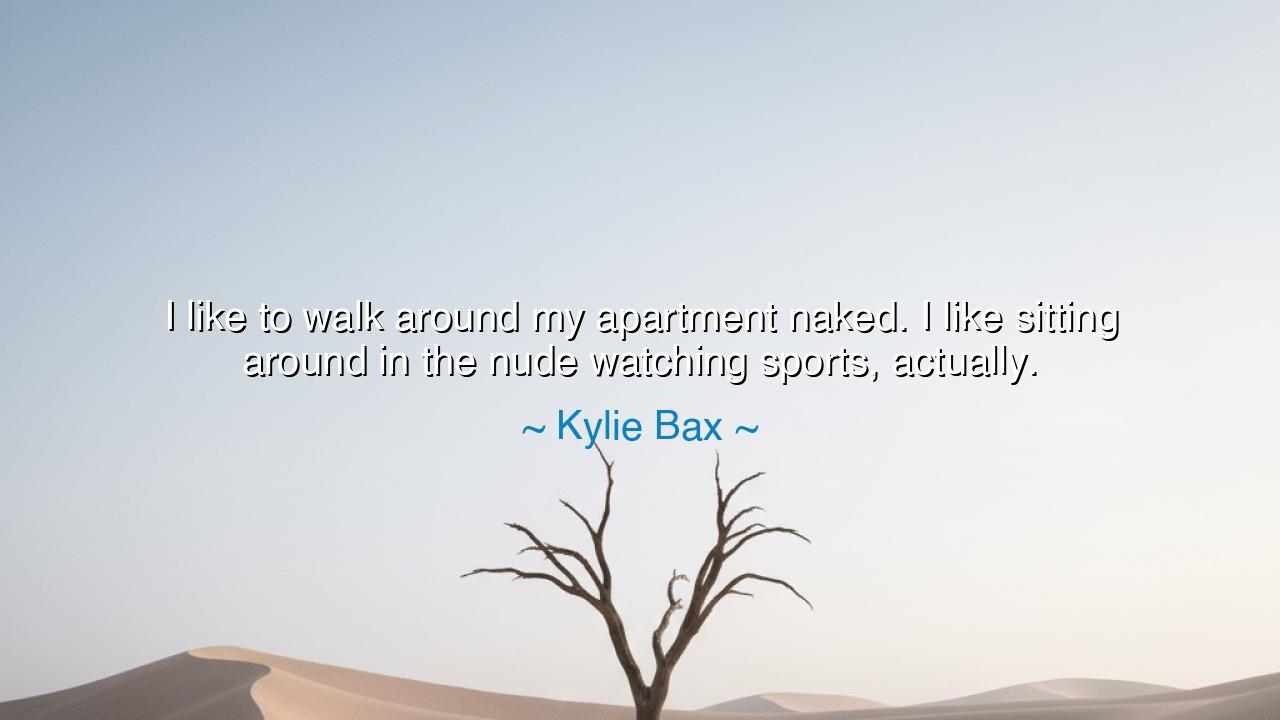
I like to walk around my apartment naked. I like sitting around
I like to walk around my apartment naked. I like sitting around in the nude watching sports, actually.






In the utterance of Kylie Bax, who declared, “I like to walk around my apartment naked. I like sitting around in the nude watching sports, actually,” there is more than a confession of comfort; there is a revelation of the ancient human yearning for simplicity, authenticity, and unburdened freedom. To dwell naked within one’s own dwelling is not merely to discard fabric—it is to cast aside the many masks that the world compels us to wear. It is to stand in the most truthful form of being, stripped of pretense, resting in one’s primal essence.
The ancients knew well that nudity was no shameful state, but the condition of our origin. In the Garden, as told by the storytellers of old, man and woman walked unclothed, unashamed, and untroubled. Only when knowledge of division entered did they cover themselves, binding their bodies with cloth and their souls with guilt. Thus, the quote of Bax echoes like a faint remembrance of Eden, a reminder that to be unclothed before oneself is to return to a forgotten wholeness.
Consider the story of Diogenes of Sinope, the Cynic philosopher, who cast away wealth, titles, and even shelter, living in a barrel so that nothing might chain his spirit. When Alexander the Great asked what boon he might bestow, Diogenes replied: “Stand out of my sunlight.” His words, like Bax’s confession, are the cry of one who finds freedom not in possession, nor in social approval, but in a pure state of being—simple, unadorned, self-sufficient. The act of reclining unclothed while watching sport may appear trivial, but in its essence it proclaims, “I am enough, and in this space, I need not disguise myself.”
There is also a lesson here in balance. The modern soul is tossed upon restless seas: work demands, appearances, and the endless chatter of society. To sit unclothed, without armor of fabric or facade, is to declare sovereignty over one’s private world. It is a reclamation of peace amidst chaos, a sacred pause in the relentless march of expectations. One might see it not as indulgence but as a ritual, a daily hymn to the spirit’s need for unencumbered rest.
And yet, do not mistake the wisdom here as a call to careless display. The ancients taught discernment—what is proper for the marketplace is not always proper for the temple. Likewise, the lesson is not that one must parade their body in all places, but that one must create a sanctuary, a domain where all masks are dropped. This sanctuary may be a room, a garden, or even the quiet hours of dawn. In that space, one must dare to be utterly themselves.
Therefore, the teaching for our time is this: Create a sacred place in your life where you are free of adornments. This may not always mean nudity of body, but certainly nudity of soul—freedom from roles, comparisons, and masks. Take time each day to sit in stillness, to let your body breathe and your spirit expand. For in such moments you rediscover the joy that requires nothing external—only the courage to be fully, gloriously yourself.
Let your practice begin simply: at the day’s end, before sleep, remove not just your garments but your burdens. Lay aside the words of others, the battles of labor, the weight of tomorrow. Sit, if only for a few breaths, in the dignity of your own presence. Remember Diogenes under the sun, remember Bax in her private joy, and remember that the highest wealth is not gold nor acclaim, but the freedom to dwell in your naked truth.
Thus, let the words of Kylie Bax not be read as frivolity, but as a whisper of ancient wisdom clothed in modern tongue: The truest comfort lies not in garments, but in the fearless embrace of one’s own being. This is the lesson: seek not to cover the soul, but to let it shine, unadorned, unashamed, and free.






AAdministratorAdministrator
Welcome, honored guests. Please leave a comment, we will respond soon